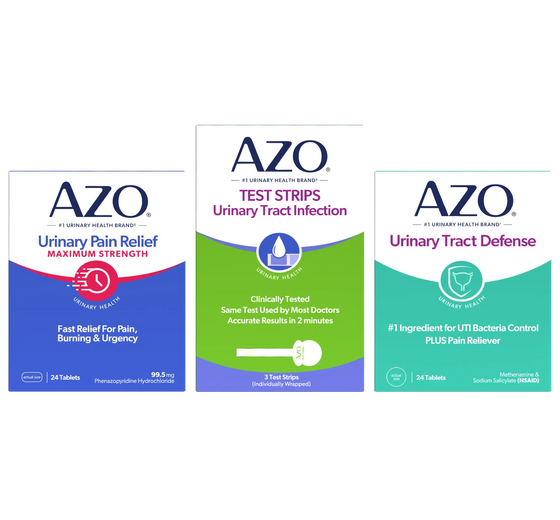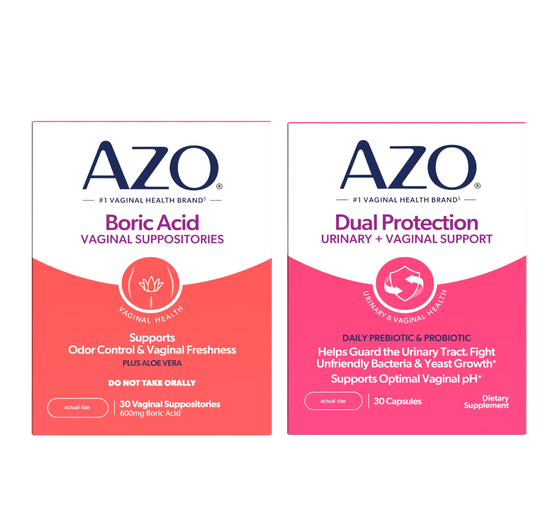
WHAT IS A YEAST INFECTION?
Upwards of 75 percent of women will experience a vaginal yeast infection at least once in their lifetime; a shocking 50 percent will have more than one.1 The overwhelming vaginal itching, thick white vaginal discharge and the inflammation, soreness and sensitivity that accompanies yeast infections is usually unmistakable. It’s enough to make us squirm in our seats just thinking about it!
Most vaginal yeast infections are caused by a fungus called Candida albicans.2 Typically, the vagina has natural mechanisms to maintain an acidic pH through a delicate balance of yeast and bacteria, but when this balance is disturbed, an infection can occur. Keep in mind, other types of infections can be great imitators with similar symptoms of discharge, itching and discomfort, so if you’re experiencing symptoms for the first time or if there is any doubt about your symptoms, a quick visit to the gyno is in order.
HOW ARE YEAST INFECTIONS CAUSED BY SEX AND WHAT LIFESTYLE ADJUSTMENTS WOULD HELP REDUCE THE RISK OF DEVELOPING A YEAST INFECTION?
A yeast infection is not considered a typical STI since you can get one without having sex. However, some women seem more prone to yeast infections when they are sexually active. Yeast infections aren’t typically spread from one partner to another during sex, but on occasion, sexual partners may pass yeast back and forth.
Yeast and bacteria tend to thrive in moist, dark places.
Generally, yeast infections do not lead to the development of an STI, but aggressive scratching to relieve the itch may inadvertently create tiny tears in the genital skin that can lead to contracting an infection during sex from STI-causing bacteria or viruses.
While engaging in intercourse with an active yeast infection is not dangerous, per se, the intense vaginal itching and burning may make sex uncomfortable. In addition, treatment might further hinder comfort since internal cream can leak out or be irritating to a partner.
Keep in mind, yeast and bacteria tend to thrive in moist, dark places. Additionally, any alteration in the vaginal environment, such as a change in pH caused by sex, semen exposure and exposure to intimacy products, among other things, can potentially predispose you to infection. Hormonal changes during pregnancy, the premenstrual week, the peri-menopausal transition and use of the birth control pill might also be contributory.
HERE ARE SOME PEARLS TO PROMOTE VAGINAL HEALTH:
-
Wear the right clothes
Wear loose-fitting, cotton-crotched undergarments. They allow the genital area to “breathe” and discourage yeast overgrowth. Get out of your wet bathing suit and workout clothes as soon as possible. -
Practice good hygiene
Avoid harsh fragrances in feminine hygiene products, douches, scented sprays and even bubble baths if you are sensitive. Dry off completely after bathing; a hairdryer on a low, cool setting might be beneficial. Avoid intimate lubricants containing glycerin if you are prone to yeast infection. -
Sustain proper diet, sleep and exercise routines
Maintain an ideal body weight as yeast can thrive in excessive skin folds. Avoid excess dietary sugar or alcohol. -
Be mindful of medications
Use antibiotics judiciously and under the careful instruction of a medical professional; they are known to encourage yeast overgrowth. -
Maintain general good health
Be mindful of your overall health. Diabetes, HIV and other ailments that lower your immunity can predispose you to developing yeast infections.
HOW DO YOU TREAT YEAST INFECTIONS AND WHAT HAPPENS IF YOU LEAVE ONE UNTREATED?
While some yeast infections will resolve naturally over time, uncomfortable symptoms make this an unpopular strategy—especially since treatment options are safe, effective and quick.
Most vaginal yeast infections can be successfully treated and cured with a short course of antifungal medication (topical cream, vaginal suppository or an oral tablet). To help relieve symptoms associated with vaginal yeast infections, AZO Yeast® Plus can be helpful.** It’s a lactose-free, multi-benefit homeopathic medicine formulated to provide relief for vaginal burning and itching, and occasional discharge caused by a yeast infection.**
ABOUT DR. KIRA SCHMID HALAK:
Dr. Kira Schmid Halak received her doctorate in naturopathic medicine from Bastyr University in Seattle, WA. Dr Halak is Senior manager of global R&D (Research & Development) for the AZO and Estroven brands and is passionate about women’s health. She was also the scientific director for the integrative medicine textbook, Disease Prevention & Treatment, and she is often heard on national and regional health programs, as well as being a frequent contributor to widely read health and wellness publications.








